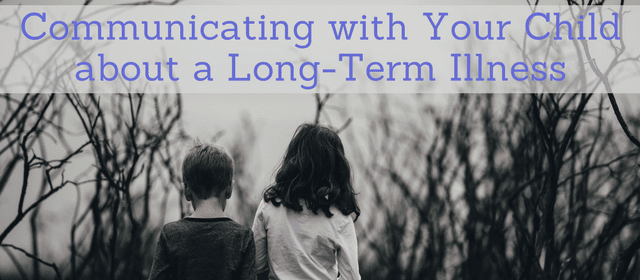Communicating with Your Child about a Long-Term Illness
Discussing Long-Term Health Issues with Children
Most people have a hard time understanding death. They have an even harder time explaining it to children, who have no concept yet of the fleeting nature of life and who cannot get their minds around ideas like eternity. If a loved one has a long-term illness that may prove fatal, it gives you more time to prepare for that conversation, but it may also raise questions that you will find difficult to answer. Children may have a hard time understanding why grandma or Uncle Joe aren’t getting better after a few days, like they do when they have a cold, and that leads to a discussion about many complex issues.
A little preparation can make it easier to have these conversations. Here are some tips for talking with your children about a relative with a long-term illness or one in Chandler hospice care:
Keep Explanations Simple

Make sure you differentiate between the long-term or fatal illness that your loved one has and other sicknesses that your child might be familiar with, like the flu. Explain that this is a sickness from which your loved one might not recover.
Be Honest
Parents want to protect their children from scary or sad feelings. When dealing with something as complex as long-term sickness, hospice care, or death, many parents might feel tempted to use euphemisms or outright lie about the situation so as not to upset their children or to overwhelm them with complex concepts. However, that will only make matters worse in the long term.
Be honest, while still remaining age appropriate. For example, you should tell your children that someone is very sick and will probably not get better. You shouldn’t tell them that they are in the hospital, but they will probably be better soon because the doctors will take care of everything. You should also not keep the fact of their sickness a secret. A lie by omission is still a lie.
Give them Time to Process
Children may not respond immediately to what you tell them. They may not understand, or they may be overwhelmed by the information. Give them time to think about what you’ve said. They may come back with more questions, or they may become sad, angry, or confused.
Follow up with them after a few days or a few weeks to see how they’re feeling or to ask if they have any questions. Try to listen more than you talk. Don’t be afraid of long silences, and don’t feel like you have to fill in all the gaps with reassurances or explanations. It’s ok to admit that you don’t have all the answers and that you are sad also.
Provide Stability and Support
Always validate children’s feelings, whatever they may be. Everyone responds to news of sickness or death differently, and there is no one “right” way to feel. Let your child know that you will support them no matter what they are feeling, and that you will always be there to talk when they are ready.
Young children may not be able to talk about their feelings – in fact, they may not even be able to label or understand what they are feeling. You must provide a stable and loving environment for them to support the chaotic emotions they may be feeling.
Having a loved one in long-term or hospice care can be scary, confusing, and sad for adults, as well as children. It can be difficult to have these conversations while you are also trying to make sense of your own feelings. However, it is important to have those conversations so that your children can process their grief in a healthy way and you can work through your feelings together as a family.
At Americare Hospice and Palliative Care in Arizona, we provide support for the whole family. Not only do we strive to provide the best hospice care near Chandler, but we also offer counseling and grief support services for family members and caretakers. We offer compassionate care for the whole family so we can make this process as easy as possible for the patient and for all loved ones. Call us in Chandler to learn more about our hospice care services, both at our facility and in your home.
Published By:
1212 N. Spencer St., Suite #2
Mesa, Arizona 85203
Office: (480) 726-7773
Fax: (480) 726-7790
Email: info@americarehospice.org







